 In honor of Earth Day on April 22nd, San Francisco’s Global Exchange Store (map) is highlighting exceptional examples of recycled and sustainably harvested goods. Fair Trade Certification does not only signify living wage standards for artisans worldwide, it also means that strict environmental regulations are in place. Fair trade discourages deforestation and the use of harmful chemicals, and encourages organic farming techniques, recycling post-consumer waste, the use of sustainably harvested natural materials, and the protection of natural resources.
In honor of Earth Day on April 22nd, San Francisco’s Global Exchange Store (map) is highlighting exceptional examples of recycled and sustainably harvested goods. Fair Trade Certification does not only signify living wage standards for artisans worldwide, it also means that strict environmental regulations are in place. Fair trade discourages deforestation and the use of harmful chemicals, and encourages organic farming techniques, recycling post-consumer waste, the use of sustainably harvested natural materials, and the protection of natural resources.
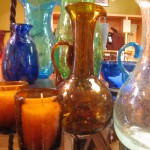 A family owned workshop in Cairo, Egypt produces glass vases, bowls, and votive candle holders from 100% recycled glass products. By sorting discarded glass bottles by color and melting and molding new shapes, this small fair trade company creates beautiful, functional, and environmentally friendly products.
A family owned workshop in Cairo, Egypt produces glass vases, bowls, and votive candle holders from 100% recycled glass products. By sorting discarded glass bottles by color and melting and molding new shapes, this small fair trade company creates beautiful, functional, and environmentally friendly products.
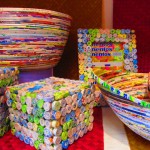 Just in time for spring, we have new recycled magazine gifts from Vietnam! Made out of long strips of magazine that are first soaked in glue and then coiled by hand, a lively spiral pattern adorns boxes, frames, and bowls in all sizes. This project not only keeps paper out of landfills, it also provides employment for over 300 artists in South Vietnam, aiming to promote self-reliance among disadvantaged people through education and training. A percentage of profits are used to fund various social work projects in communities, dealing with social issues, clean water projects, vocational training equipment purchases, subsidized teacher wages and a scholarship fund for the artisans’ children.
Just in time for spring, we have new recycled magazine gifts from Vietnam! Made out of long strips of magazine that are first soaked in glue and then coiled by hand, a lively spiral pattern adorns boxes, frames, and bowls in all sizes. This project not only keeps paper out of landfills, it also provides employment for over 300 artists in South Vietnam, aiming to promote self-reliance among disadvantaged people through education and training. A percentage of profits are used to fund various social work projects in communities, dealing with social issues, clean water projects, vocational training equipment purchases, subsidized teacher wages and a scholarship fund for the artisans’ children.
While recycling keeps waste out of landfills, sustainably harvested goods – made out of natural materials – keeps materials like plastic and paper from ever being made in the first place. Fair trade celebrates products coming from nature, and what better way to celebrate Earth Day than with Mother Nature’s own gifts.
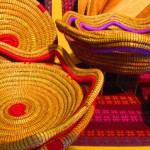 A women’s co-operative on the Atlantic coast of Nicaragua is taking advantage of an abundant local raw material – pine needles – to make beautiful, environmentally friendly, baskets. Starting in 1993 with a group of twelve women, it now employs over thirty women who make their living from weaving baskets. The sale of these baskets help to build a sustainable community in an extremely impoverished part of Nicaragua. These decorative baskets are a great example of a free renewable resource that can be crafted into a piece of art!
A women’s co-operative on the Atlantic coast of Nicaragua is taking advantage of an abundant local raw material – pine needles – to make beautiful, environmentally friendly, baskets. Starting in 1993 with a group of twelve women, it now employs over thirty women who make their living from weaving baskets. The sale of these baskets help to build a sustainable community in an extremely impoverished part of Nicaragua. These decorative baskets are a great example of a free renewable resource that can be crafted into a piece of art!
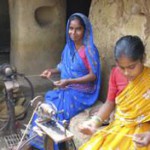 Ahimsa, or “cruelty-free” silk is wild silk that is cultivated on forest trees. The silk is spun after the silk worm has become a moth and flown out of the cocoon, which is often not the case for mass-produced silk. It is typical for silk farmers to kill silkworms by tossing cocoons into boiling water or hot ovens before they transform into moths, so that the silk cocoons will not be damaged. Ahimsa silk thread is spun from broken cocoons, which gives a slightly different texture than undamaged silk cocoons, but does not kill any living beings in the process.
Ahimsa, or “cruelty-free” silk is wild silk that is cultivated on forest trees. The silk is spun after the silk worm has become a moth and flown out of the cocoon, which is often not the case for mass-produced silk. It is typical for silk farmers to kill silkworms by tossing cocoons into boiling water or hot ovens before they transform into moths, so that the silk cocoons will not be damaged. Ahimsa silk thread is spun from broken cocoons, which gives a slightly different texture than undamaged silk cocoons, but does not kill any living beings in the process.
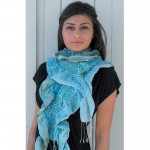 Fair Trade Federation member Sevya is using ahimsa silk for their line of fair trade silk scarves (which you can see at San Francisco’s Global Exchange Store!). Sevya is not only helping to sustain the forests and ancient cultures that live in harmony with nature, but also sustaining the lives of those producing the scarves. Sevya works with non-profits in Jharkhand, India to develop training programs for low-caste and tribal women to use foot pedal and power operated spinning and reeling machines, self-help groups where the women save money weekly in a common pool, and micro-credit operations for the cultivators, spinners, and weavers.
Fair Trade Federation member Sevya is using ahimsa silk for their line of fair trade silk scarves (which you can see at San Francisco’s Global Exchange Store!). Sevya is not only helping to sustain the forests and ancient cultures that live in harmony with nature, but also sustaining the lives of those producing the scarves. Sevya works with non-profits in Jharkhand, India to develop training programs for low-caste and tribal women to use foot pedal and power operated spinning and reeling machines, self-help groups where the women save money weekly in a common pool, and micro-credit operations for the cultivators, spinners, and weavers.
We encourage you to deepen your commitment to the Fair Trade principle of environmental stewardship by consuming wisely. Think about the different resources used in creating all the things around us, and whether or not you can lessen your carbon footprint with your purchases. Celebrate this Earth Day by supporting the Fair Trade movement, and stop by a Global Exchange Fair Trade Store near you for recycled, natural, and sustainable handicrafts from around the world!
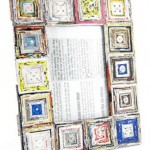 This Father’s Day, show your Dad that he raised a smart kid with a good heart by giving him a Fair Trade gift! Shop online at the Global Exchange Online Store for everything from recycled bike chain coat hooks to recycled inner tube wallets to heavy-duty steel and brass scissors. Or, come into the Global Exchange Fair Trade Store in San Francisco (map) for these gifts and more – like our huge selection of handmade picture frames! Today through Father’s Day, Sunday, June 19, buy one frame, get the second 50% OFF!
This Father’s Day, show your Dad that he raised a smart kid with a good heart by giving him a Fair Trade gift! Shop online at the Global Exchange Online Store for everything from recycled bike chain coat hooks to recycled inner tube wallets to heavy-duty steel and brass scissors. Or, come into the Global Exchange Fair Trade Store in San Francisco (map) for these gifts and more – like our huge selection of handmade picture frames! Today through Father’s Day, Sunday, June 19, buy one frame, get the second 50% OFF!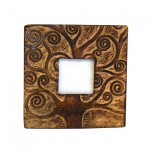
 Handcrafted in India, these tree of life picture frames can hold 3″x3″, 4″x6″, or 5″x7″ photos and. They are truly unique, each with slight color variations of hand-carved mango wood. Make it a complete set with a matching box!
Handcrafted in India, these tree of life picture frames can hold 3″x3″, 4″x6″, or 5″x7″ photos and. They are truly unique, each with slight color variations of hand-carved mango wood. Make it a complete set with a matching box! indigenous Bodo tribe of Assam, India. The artisan cooperative uses 100% cotton scrap fabric, woven on bamboo looms, to create stylish pieces that incorporate traditional Bodo design elements. The 5″x7″ recycled fabric frames come in a variety colors, in both single and double frames.
indigenous Bodo tribe of Assam, India. The artisan cooperative uses 100% cotton scrap fabric, woven on bamboo looms, to create stylish pieces that incorporate traditional Bodo design elements. The 5″x7″ recycled fabric frames come in a variety colors, in both single and double frames.





